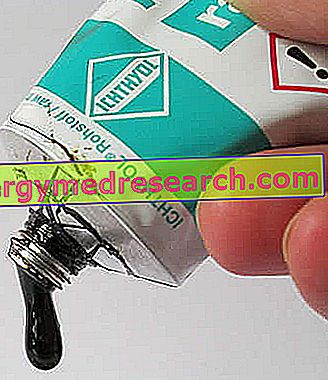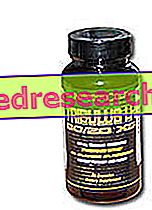Generality
To uncork the stuffy nose it is possible to use different methods and products, both natural and pharmaceutical.

The stuffy nose - a condition also known as nasal congestion - is a symptom of various disorders and diseases affecting the airways. This condition creates breathing difficulties and discomfort for patients who, therefore, ask the doctor or pharmacist for effective remedies to fight it. Of course, the type of treatment you decide to take to uncork your nose depends on the disorder that led to the appearance of the aforementioned condition.
Why does the nose stop?
The nose stops - or better, it gets congested - substantially due to an accumulation of mucus inside the nasal cavity, a consequence of inflammatory processes of the mucous membranes of the respiratory tract. There are several causes that lead to nasal congestion, among these we remember the flu states and colds, allergies and the administration of some drugs.
In some cases, however, the stuffy nose could also derive from an enlargement of the adenoids, or from the deviation of the nasal septum. In such situations, to uncork the nose, drugs and natural remedies are not enough and it is necessary to resort to surgery.
The main methods and products used to uncork the nose, both pharmacological and natural, will be described below.
drugs
Drugs Used to Uncork the Nose
The drugs that can be used to uncork the nose are different. The use of a certain medicine rather than another depends essentially on the cause that caused the nasal congestion.
Nasal decongestants
The decongestants used to uncork the nose are mainly formulated in the form of nasal sprays, but in some cases they can be formulated in such a way as to allow them to be administered orally.
They are used in many situations, either alone or in combination with other active ingredients. For example, medicines based only on decongestants are widely used to uncork the nose in case of colds and flu illnesses; while medicines based on decongestant active ingredients in association with corticosteroids or antihistamines are indicated to uncork the nose in case of allergies.
Among the active ingredients with decongestant action, we find:
- Nafazolina (Rinazina®);
- Ephedrine (Argotone®, Deltarinolo®);
- Xilometazoline (Actigrip Nasale®);
- Oxymetazoline (Vicks Sinex®);
- Phenylephrine (Tachifludec®).
Action mechanism
Decongestants exert a direct sympathomimetic action and act as agonists against alpha-1 adrenergic receptors located at the level of the nasal mucosa. Thanks to this activity, the active ingredients in question are able to induce the constriction of the blood vessels of the nasal mucosa, decreasing the local blood flow and reducing the swelling that typically characterizes the closed-nose condition.
Side effects and contraindications
Among the side effects that may occur following the use of decongestant drugs to uncork the nose, we mention: tachycardia, insomnia, headache and hypertension. Fortunately, these effects occur rarely. Furthermore, it is necessary to point out that the excessive and prolonged use of decongestants in the form of nasal sprays leads to the onset of a paradoxical effect in which there is a clear worsening of nasal congestion .
With regard to contraindications and use during pregnancy and lactation, on the other hand, it is advisable to consult the package insert of the medicinal product to be used.
Antihistamines
Antihistamines can be used to uncork the nose when congestion is induced by allergic disorders, such as allergic rhinitis. The antihistamines used to uncork the nose are formulated both as nasal sprays and in pharmaceutical formulations suitable for oral administration. Among these, we recall:
- Azelastine (Allespray®);
- Desloratadine (Neoclarityn®, Aerius®);
- Cetirizine (Reactine®).
Action mechanism
As you can easily guess from their very name, antihistamines work by interfering negatively with the activity of histamine, one of the mediators involved in allergic reactions and diseases.
Side effects and contraindications
Usually, nasal antihistamines are well tolerated and do not cause particularly serious side effects.
Oral antihistamines, on the other hand, could give rise to headache, dry mouth, fatigue, palpitations and tachycardia.
The use of antihistamines is generally contraindicated in the presence of known allergies to the active ingredients used, during pregnancy and during lactation. However, for more information, read the package insert of the medicine you want to use and ask your doctor for advice.
Cortisonici
Similarly to antihistamines, cortisone drugs - or corticosteroid drugs - can be used to uncork the nose in the presence of allergic diseases. Their use is also indicated in the case of nasal polyposis.
To treat these conditions, these drugs are generally prescribed in the form of nasal sprays. Among the active ingredients most used in this area we mention fluticasone (Avamys®) and mometasone (Nasonex®).
Action mechanism
Corticosteroid drugs have a marked anti-inflammatory action exerted by inhibiting the release of different mediators involved in inflammatory processes. Therefore, taking these drugs reduces the inflammation of the mucous membranes of the nose, favoring their release.
Side effects and contraindications
Among the side effects that may occur following the use of corticosteroid drugs to uncork the nose, we mention: allergic crises in sensitive subjects, nasal bleeding, headache, irritation, burning and / or dryness of the nasal mucosa.
The use of corticosteroids is contraindicated in case of known allergy to the drug used, during pregnancy and during lactation. However, it is always good to ask your doctor for advice and carefully read the information on the package insert of the medicine you intend to use.
aerosol Therapy
Even aerosol therapy, performed with appropriate drugs, can be very useful for uncorking the nose. For this purpose, medicines containing active ingredients are used, with a fluidifying and mucolytic action, able to facilitate the expulsion of the mucus, thus the liberation of the nose.
The drugs that can be administered by aerosol to uncork the nose are mucolytic and fluidifying (such as, for example, N-acetylcysteine), possibly associated with corticosteroid drugs. This type of drug is especially useful when nasal congestion is the symptom of respiratory pathologies characterized by mucus hypersecretion (phlegm).
In less serious cases, on the other hand, aerosol therapy could be useful to uncork the nose even if performed simply with physiological solution .
Please note
In most cases, aerosol therapy is a very effective treatment for uncorking the nose. In this regard, however, it is important to remember that - to ensure the absorption of drugs or saline at the level of the mucous membrane of the nose - it is necessary to use the nasal fork and not the mask.
Acqua di Sirmione
Acqua di Sirmione to uncork the nose
Sirmione water is a very useful natural remedy for uncorking the nose. It is a particular sulphurous thermal salt-bromine-iodine water able to favor the fluidization of the mucus and capable of exerting anti-inflammatory and decongestant properties at the level of the nasal mucosa and the upper airways. The product is marketed in the form of nasal sprays and has the great advantage of being able to be used in adults, the elderly and very young children starting from 8 months of life. However, as a precaution, before using Sirmione water to uncork the nose, it is always a good idea to ask your doctor or pediatrician for advice.
Nasal Washes
Nasal Washes to Uncork the Nose
Nasal washes with saline solutions are another method that can be effectively used to uncork the nose.
These washes can be used to counteract nasal congestion caused by both colds and allergic disorders.
However, for more information, we recommend reading the dedicated article: Lavas Nasali.
fumigations
Suffumigi to uncork the nose
The fumigations with essential oils represent a valid natural remedy widely used to uncork the nose. For this purpose, essential oils with balsamic and expectorant activity should be used, such as eucalyptus essential oil, mint essential oil and melaleuca essential oil (Tea Tree Oil).
If you want to avoid the use of essential oils, to uncork the nose it is also possible to carry out fumigations by dissolving the coarse salt in boiling water (suffumigi with coarse salt).
Nasal plasters
Nasal Cerottini to Uncork the Nose
Nasal plasters are medical devices that can be used in the presence of a stuffy nose, even if, in truth, they do not exert a decongestant or anti-inflammatory action capable of freeing the nasal cavities from mucus and inflammation. In fact, these particular patches carry out a mechanical enlargement of the nasal passages which allows the patient to breathe more easily. Therefore, although they may be very useful for patients, the plasters in question are not able to uncork the nose (for more information: Nasal Cerottini).



